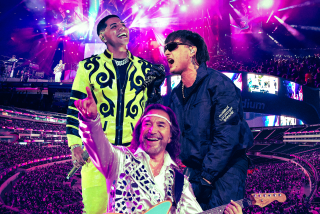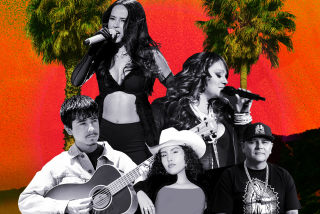Rudy Salas, cofounder of mainstay Chicano R&B band Tierra, dies at 71
Rudy Salas, founding guitarist of the Chicano R&B band Tierra and audacious pioneer of Los Angeles’ soulful Eastside sound, died in his sleep Tuesday morning at age 71.
His stepdaughter, Cresi, says that Salas and his wife, Joanna Alvarado Salas, had just celebrated their 23rd wedding anniversary in Las Vegas. The cause of his death is yet to be determined, but Salas’ family says it was unrelated to COVID-19.
Salas was born Jan. 5, 1949, in Lincoln Heights to Mexican American parents Rudy Sr. and Margaret Salas. “He was born on the only day it ever snowed in L.A.,” recalls his maternal uncle Art Brambila, who for a time was Tierra’s manager and producer.
Salas barely spoke Spanish as a child, but with time he picked up some Mexican folk standards from his mother and learned his first guitar chords from Brambila. As the Salas Brothers, Rudy and his brother, singer and percussionist Steve Salas, got practice performing mariachi songs at local parties.
It was during the late 1960s that the teenage Rudy and Steve, swept up in the excitement of the city’s burgeoning civil rights movement, took part in the historic student walkouts protesting unequal educational opportunities. In 1970 they demonstrated against the Vietnam War in the Chicano Moratorium — which devolved into violent clashes between protesters and L.A. County sheriff’s deputies, resulting in the tragic death of journalist Ruben Salazar, who was hit by a tear gas canister. Shaken by the upheaval of the times, Rudy and Steve joined the ranks of Bobby Espinosa’s radical Latin rock outfit, El Chicano, which also shared a scene with Long Beach funk band War.
“There was something rebellious about our music,” said Rudy in a 1998 interview with the Los Angeles Times. “We started Tierra during the heyday of the Chicano movement, when there was a political and social consciousness about what was going on with the system and all that.”
In 1972 the brothers broke away from the pack and founded their own band, Tierra. They released their 1973 self-titled debut on 20th Century Records, further fusing brown-eyed soul, salsa, jazz and progressive rock influences, and engineering a sound that would evolve along with the rapidly growing Eastside. Early songs like “Zoot Suit Boogie” and “Barrio Suite” channeled the fiery verve and swagger of East L.A.’s Mexican American community.
“Back then, it was really rare to sign Chicano bands to labels like 20th Century,” says Brambila, who worked in artist development at Capitol Records during the 1970s. “It was a small Motown in East L.A.”
The 1980s saw Tierra’s reach expand well beyond the Eastside. Off its 1980 album “City Nights,” Tierra’s first single “Together” — an effervescent funk rendition of the 1967 original by Philly soul group the Intruders — would eventually reach No. 18 on the Billboard Hot 100, where it remained for five weeks. Tierra continued its winning streak in 1981 with “Memories,” which peaked at No. 62, and “La La Means I Love You” at No. 72.
That same year the band would be invited to play an opening gig at New York’s Carnegie Hall for the legendary Afro-Cuban percussionist and bandleader Mongo Santamaria. But as Salas recalled in a 2017 interview, the great conga drummer deferred to the band, letting them take over the headlining spot. A murderers’ row of New York salsa pioneers — including Willie Colón, Rubén Blades and Héctor Lavoe — happened to be backstage, offering well wishes to the members of Tierra. It marked a critical turning point for the Chicano band, as well as a shining moment of solidarity between Mexican and Caribbean diasporas in the United States.
“When my younger brother [Steve] and I were kids and we practiced in front of our mother, she would say, ‘One of these days, you guys are gonna play Carnegie Hall,’” said Salas. “When Tierra was really strong, we played there and flew my parents in. We got a standing ovation, and I saw my mom and dad crying.”
For the rest of their lives, the Salas brothers’ bond would be tentative and rife with power struggles and creative disputes. As the eldest of his siblings, Rudy quickly assumed the position of band patriarch, and by 1997 Steve had departed the band and subsequently founded his own iteration of Tierra — with the same name. “I was always leader of the band,” Rudy told The Times in 2002, before Steve could brusquely retort: “Because he called himself the leader.”
By 2002 the brothers were in talks to regroup as one Tierra. The band finagled a one-night reunion at the Conga Room in January of that year. “I guess we lost sight that we both needed each other,” said Steve.
Over the years, most of Tierra’s members passed away: In August 2009 vocalist-guitarist Isaac Avila died of a brain hemorrhage; drummer Johnny “Sticks” Valenzuela died in 2010. Bassist Steve Falomir died of a stroke January 2012.
Outfitted with new band members in the years since, Tierra continued to release albums and compilations, and became the community’s go-to band for mutual aid efforts including fundraisers to help pay off medical debts for family and friends, or the Alex Speaks Foundation, which works in support of children with autism. One of Tierra’s last recordings included a 2016 soul jingle titled “Merry Christmas, My Love” — the video sees a jolly Salas greeting his bandmates in full Santa Claus disguise before swapping to his signature stage look: a fedora and sunglasses.
“Rudy was a real perfectionist. Everyone, everything had to be in their right place,” says Hector Leon, Tierra’s manager since 2014. “But if anybody was down, Rudy would be there to pick ’em up.”
Backed by his wife and social media maven Joanna, Salas posted a video on Facebook dated Dec. 11 promising new music with his brother Steve in 2021. Brambila confirms that he managed to get the brothers in the studio one last time this year in June, to work on a protest song titled “The Angry Giant Rising,” which he’s since published on YouTube. “As their uncle, I was the only one who was able to bring them back,” says Brambila. The song is dedicated to Ruben Salazar, who died 50 years ago this year. Rudy’s daughter, Rita Salas, assists on background vocals.
“Don’t you preach equal opportunities/When you lock our kids in cages/And they’re crying to be free,” sing the Salas family. “Hey, don’t you know?/From horizon to horizon/There’s an angry giant rising/You’re no longer fooling me.”
Rudy Salas is survived by his wife, Joanna; his children Rita and David Salas with former wife Martha; stepchildren Cresi, Marlena and Jesse; his younger brothers Steve, Richard and Robert; and 11 grandchildren.
More to Read
The biggest entertainment stories
Get our big stories about Hollywood, film, television, music, arts, culture and more right in your inbox as soon as they publish.
You may occasionally receive promotional content from the Los Angeles Times.











